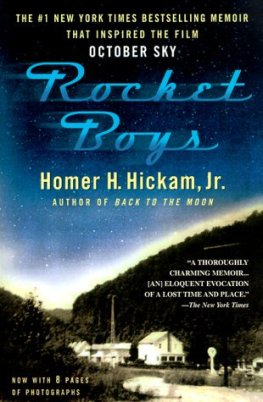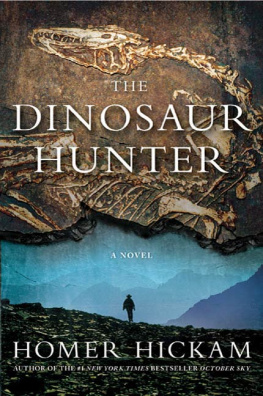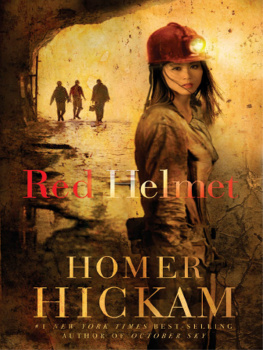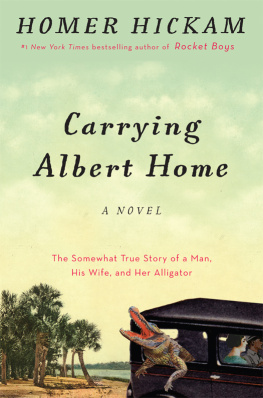Homer H. Hickam, Jr.
ROCKET BOYS
A Memoir
To Mom and Dad
And the people of Coalwood
All one can really leave ones children is whats inside their heads. Education, in other words, and not earthly possessions, is the ultimate legacy, the only thing that cannot be taken away.
Dr. Wernher von Braun
All Ive done is give you a book. You have to have the courage to learn whats inside it.
Miss Freida Joy Riley
THE ROCKET BOYS of the Big Creek Missile Agency and their lives and times were real, but it should be mentioned that I have used a certain authors license in telling their story. While I have used the actual names for each of the boys and my parents and most of the people in this book, I have used pseudonyms for others and also sometimes combined two or more people into one when I felt it necessary for clarification and simplification. I have also taken certain liberties in the telling of the story, particularly having to do with the precise sequence of events and who may have said what to whom. Nevertheless, my intention in allowing this narrative to stray from strict nonfiction was always to illuminate more brightly the truth.
I OWE A DEBT OF GRATITUDE to many people for this book. First, I extend my infinite appreciation to Mickey Freiberg of The Artists Agency in Los Angeles for recognizing the value of this work from its first glimmering. It was his belief in the story, and his confidence in my ability to write it, that gave me the opportunity I needed to proceed. Heartfelt thanks are due David Groff for his superb editorial assistance, and to Frank Weimann of The Literary Group in New York for taking the manuscript, with all his considerable skill, to the publishers. The assistance of Amir Fedder and Rich Capogrosso at The Artists Agency, and Jessica Wainwright, Lauren Mactas, and Kim Marsar at The Literary Group was also invaluable and much appreciated.
I think it wise for me to also thank the guardian angels that I have overworked over the years because they probably had something to do with my getting Tom Spain of Delacorte Press as my editor. Toms ability to find the core truths of this book (and sometimes even pointing them out to me when I didnt see them) has shaped it into all that it is. Many thanks to Delacortes Mitch Hoffman for his many kindnesses. Karen Mender, Carisa Hays, Linda Steinman, and Vicki Flick have also been very helpful. Throughout this whole process, Carole Baron, Leslie Schnur, and all of their staff at Delacorte have been unfailingly enthusiastic and professional in their support of this book. I very much appreciate their efforts.
I wish to express my appreciation to Chuck Gordon, Mark Sternberg, and Peter Cramer of Daybreak Productions for taking what was then an uncompleted manuscript and working it through the Hollywood labyrinth, and to Joe Johnston, Larry Franco, Lewis Colick, and all of the staff of the Universal Studios motion picture production crew for translating my story to the silver screen. They made the impossible happen.
I cannot thank enough my readers of the manuscript as it developed, especially Linda Terry, who saw it from the first very rough drafts and helped me to improve it through all the versions that followed. My thanks further to Linda for her love and support during the entire period of creation. I could not have done it without her. Much help also came from Big Creek High School classmate Emily Sue Buckberry, who kindly offered historical corrections, editorial commentary, and morale boosts throughout. Special thanks are due Harry Kenneth Lavender, my uncle, for his technical assistance on coal mining and life in general in the coalfields.
Perry Turner and Pat Trenner, editors at Air & Space/Smithsonian magazine, are due many thanks for publishing the article, The Big Creek Missile Agency, which gained the attention that led to this book.
Finally, much gratitude is owed to the men who were once the rocket boys for agreeing to let me write about them as they were so many years ago, to Mrs. Jan Siers, who gave me permission to include Sherman, to my brother Jim, who assented to my dredging up our teenaged conflicts, to several high-school classmates who wish to remain anonymous but assisted me and are in this book in one guise or another, and to my mother, who has maintained her sense of humor over the sometimes strange maneuvers of her second son to this day.
Homer H. Hickam, Jr.May 1998
UNTIL I BEGAN to build and launch rockets, I didnt know my hometown was at war with itself over its children and that my parents were locked in a kind of bloodless combat over how my brother and I would live our lives. I didnt know that if a girl broke your heart, another girl, virtuous at least in spirit, could mend it on the same night. And I didnt know that the enthalpy decrease in a converging passage could be transformed into jet kinetic energy if a divergent passage was added. The other boys discovered their own truths when we built our rockets, but those were mine.
Coalwood, West Virginia, where I grew up, was built for the purpose of extracting the millions of tons of rich bituminous coal that lay beneath it. In 1957, when I was fourteen years old and first began to build my rockets, there were nearly two thousand people living in Coalwood. My father, Homer Hickam, was the mine superintendent, and our house was situated just a few hundred yards from the mines entrance, a vertical shaft eight hundred feet deep. From the window of my bedroom, I could see the black steel tower that sat over the shaft and the comings and goings of the men who worked at the mine.
Another shaft, with railroad tracks leading up to it, was used to bring out the coal. The structure for lifting, sorting, and dumping the coal was called the tipple. Every weekday, and even on Saturday when times were good, I could watch the black coal cars rolling beneath the tipple to receive their massive loads and then smoke-spouting locomotives straining to pull them away. All through the day, the heavy thump of the locomotives steam pistons thundered down our narrow valleys, the town shaking to the crescendo of grinding steel as the great trains accelerated. Clouds of coal dust rose from the open cars, invading everything, seeping through windows and creeping under doors. Throughout my childhood, when I raised my blanket in the morning, I saw a black, sparkling powder float off it. My socks were always black with coal dirt when I took my shoes off at night.
Our house, like every house in Coalwood, was company-owned. The company charged a small monthly rent, automatically deducted from the miners pay. Some of the houses were tiny and single-storied, with only one or two bedrooms. Others were big two-story duplexes, built as boardinghouses for bachelor miners in the booming 1920s and later sectioned off as individual family dwellings during the Depression. Every five years, all the houses in Coalwood were painted a company white, which the blowing coal soon tinged gray. Usually in the spring, each family took it upon themselves to scrub the exterior of their house with hoses and brushes.
Each house in Coalwood had a fenced-off square of yard. My mother, having a larger yard than most to work with, planted a rose garden. She hauled in dirt from the mountains by the sackful, slung over her shoulder, and fertilized, watered, and manicured each bush with exceeding care. During the spring and summer, she was rewarded with bushes filled with great blood-red blossoms as well as dainty pink and yellow buds, spatters of brave color against the dense green of the heavy forests that surrounded us and the gloom of the black and gray mine just up the road.







